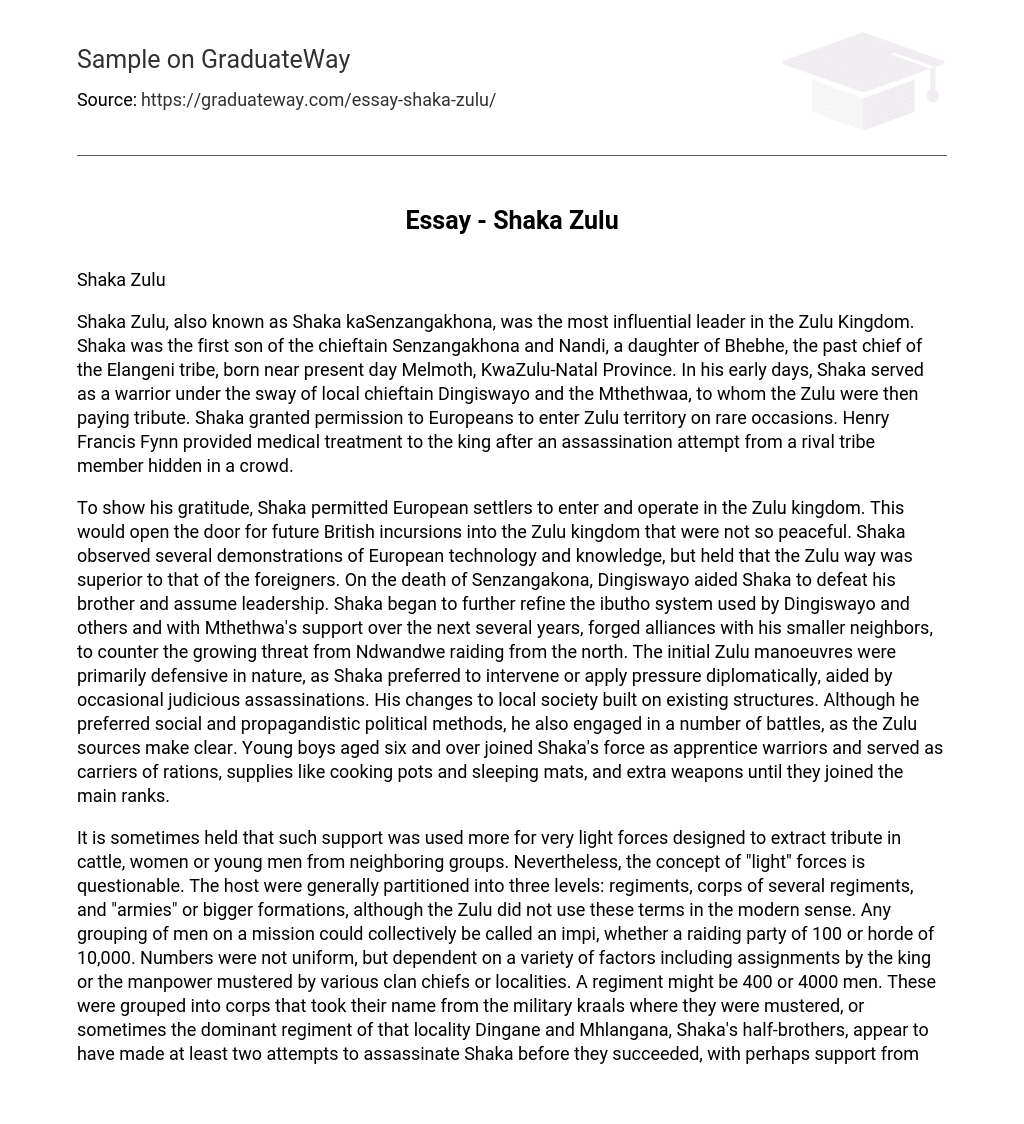Shaka Zulu
Shaka Zulu, also known as Shaka kaSenzangakhona, was the most influential leader in the Zulu Kingdom. Shaka was the first son of the chieftain Senzangakhona and Nandi, a daughter of Bhebhe, the past chief of the Elangeni tribe, born near present day Melmoth, KwaZulu-Natal Province. In his early days, Shaka served as a warrior under the sway of local chieftain Dingiswayo and the Mthethwaa, to whom the Zulu were then paying tribute. Shaka granted permission to Europeans to enter Zulu territory on rare occasions. Henry Francis Fynn provided medical treatment to the king after an assassination attempt from a rival tribe member hidden in a crowd.
To show his gratitude, Shaka permitted European settlers to enter and operate in the Zulu kingdom. This would open the door for future British incursions into the Zulu kingdom that were not so peaceful. Shaka observed several demonstrations of European technology and knowledge, but held that the Zulu way was superior to that of the foreigners. On the death of Senzangakona, Dingiswayo aided Shaka to defeat his brother and assume leadership. Shaka began to further refine the ibutho system used by Dingiswayo and others and with Mthethwa’s support over the next several years, forged alliances with his smaller neighbors, to counter the growing threat from Ndwandwe raiding from the north. The initial Zulu manoeuvres were primarily defensive in nature, as Shaka preferred to intervene or apply pressure diplomatically, aided by occasional judicious assassinations. His changes to local society built on existing structures. Although he preferred social and propagandistic political methods, he also engaged in a number of battles, as the Zulu sources make clear. Young boys aged six and over joined Shaka’s force as apprentice warriors and served as carriers of rations, supplies like cooking pots and sleeping mats, and extra weapons until they joined the main ranks.
It is sometimes held that such support was used more for very light forces designed to extract tribute in cattle, women or young men from neighboring groups. Nevertheless, the concept of “light” forces is questionable. The host were generally partitioned into three levels: regiments, corps of several regiments, and “armies” or bigger formations, although the Zulu did not use these terms in the modern sense. Any grouping of men on a mission could collectively be called an impi, whether a raiding party of 100 or horde of 10,000. Numbers were not uniform, but dependent on a variety of factors including assignments by the king or the manpower mustered by various clan chiefs or localities. A regiment might be 400 or 4000 men. These were grouped into corps that took their name from the military kraals where they were mustered, or sometimes the dominant regiment of that locality Dingane and Mhlangana, Shaka’s half-brothers, appear to have made at least two attempts to assassinate Shaka before they succeeded, with perhaps support from Mpondo elements, and some disaffected iziYendane people. While the British colonialists considered his regime to be a future threat, allegations that white traders wished his death are problematic given that Shaka had granted concessions to whites prior to his death, including the right to settle at Port Natal (now Durban).
Shaka had made enough enemies among his own people to hasten his demise. It came relatively quickly after the devastation caused by Shaka’s erratic behavior after the death of his mother Nandi. According to Donald Morris in this mourning period Shaka ordered that no crops should be planted during the following year, no milk (the basis of the Zulu diet at the time) was to be used, and any woman who became pregnant was to be killed along with her husband. At least 7,000 people who were deemed to be insufficiently grief-stricken were executed, though it wasn’t restricted to humans, cows were slaughtered so that their calves would know what losing a mother felt like. Shaka was a strict, yet very influential ruler.





